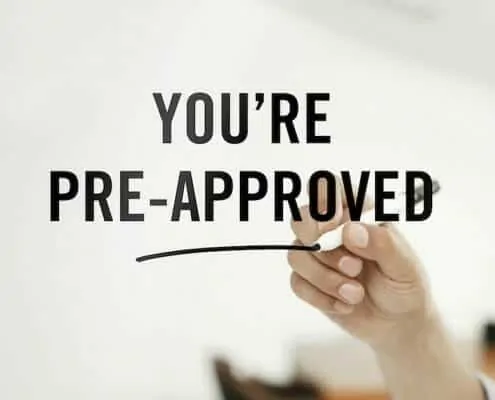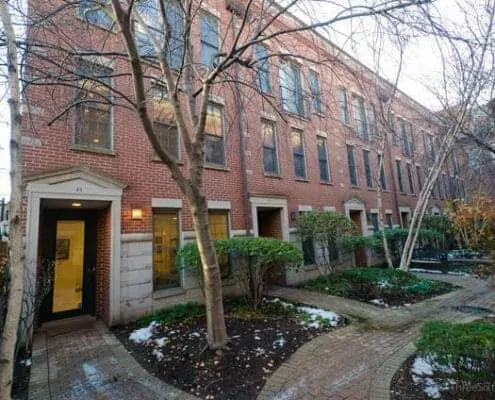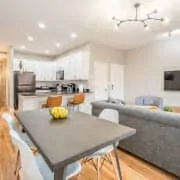Best Tips For First-Time Home Buyers
Here are our best tips for first-time home buyers in Chicago. If you’re a first-time home buyer, it’s really important to research and prepare for the home buying process. Follow these tips for a successful home purchase in today’s difficult market.
1. Save a downpayment
If you’ve been thinking of shopping for a home, you’ve likely been focused on saving your down payment. While 20% is often the goal, the good news is lenders today allow for substantially less.
“Home loan products with down payments as low as 5% (or even 3%) are available.”
That said, a down payment of less than 20% can mean paying private mortgage insurance (PMI). PMI is essentially the lender’s way of protecting itself and in no way contributes to your equity or net worth. There’ll be more about PMI (and how to avoid it) when we discuss mortgage types.
2. Ask yourself: what can I really afford?
To answer that, start by using this super easy mortgage calculator. Try various combinations until you find numbers that work with your budget.
“Keep in mind the budget should include 3-5% of your purchase price for closing costs.”
Moreover, after buying your home you’ll need cash on hand to pay for the movers, maintenance and/ or condo assessments, new furnishings and any home improvements you’d like to make.
In other words, don’t forget to build in a cushion.
Resource: All about the home buying process
3. Find an exceptional Chicago real estate broker

Best tips for first-time home buyers in Chicago
Ask friends and family for the names of local experienced brokers who know the Chicago neighborhoods and buildings you’re considering.
“Your broker will be your real estate coach – helping you access excellent lenders, attorneys and home inspectors.”
Invest your time in selecting the right Chicago real estate broker, it will make all the difference in your home buying experience.
Once you’ve selected your broker, discuss the buying process so you know what to expect from contract to closing. The market for the best properties is competitive and it’s very important to be ready to move forward the moment you find the right home.
Resources: Why use a buyer’s broker
4. Negotiate favorable terms
In this current high mortgage interest rate market, one of the most valuable tips for first-time home buyers is to negotiate favorable terms that help lower your monthly mortgage payments.
“Ask the seller to pay your closing costs and/ or a 1-2 year interest buy down.”
Motivated sellers will do what it takes to make the deal happen. And there are motivated sellers in many Chicago neighborhoods, even now.
5. Explore grants and down-payment assistance programs
Every year in Chicago there are usually a variety of programs in play. Many have limited funding and are thus here today and gone tomorrow.
Let’s take a look at two long-standing programs worth considering:
Chicago Housing Authority Home Ownership Program
The Chicago Housing Authority’s (CHA) Homeownership Program offers up to $20,000 in assistance for first-time homebuyers. To qualify you need to be a City of Chicago home buyer meeting the eligibility requirements.
“Assistance programs can help you fund your down payment and lower your interest rate.”
The program is for City of Chicago home buyers who need help saving a down payment, lowering your loan’s interest rate and covering closing costs. Attend a CHA orientation for program requirements and info on how to apply.
Resource: Learn more about Chicago Housing Authority’s (CHA) Homeownership Programs
Illinois Housing Development Authority Programs
While Illinois Housing Development Authority (IHDA) Programs are very helpful for first-time buyers, actually any buyer can apply. You just have to occupy the new home as your primary residence within 60 days of closing.
IHDA programs can be used for both financial assistance and for closing costs. Even if you have 20% down payment already saved, IHDA can still help with your closing costs.These loans take the same amount of time as “normal” mortgages and are managed by approved lenders. As such there are no extra reviews delaying your loan.
You can apply online with most IHDA lenders. All IHDA documents can be digitally signed except for the final mortgage and note which are signed at the closing table.
Resource: Learn more about Illinois Housing Development Authority (IHDA) Programs
6. Check your credit score
Next on our list of best tips for first-time home buyers in Chicago is to check your credit score. Your credit score is critically important. It, along with many other factors, determines whether you qualify for a mortgage and can impact the interest rate you’re offered.
Order free copies of your credit report from Experian, Equifax and TransUnion. Then dispute any errors that could hurt your score.
Keep credit card balances as low as possible and pay bills on time.
You’ll want to keep current credit cards open as closing a card can increase the portion of available credit you use, which can lower your score.
“Before your planned home purchase, avoid getting a car loan or opening any new credit accounts.”
7. Evaluate mortgage types
Unless you’re lucky enough to be a cash buyer, securing a good mortgage is of course critical.
The most common types of mortgages are Conventional, FHA, VA and Doctor loans. Let’s take a look at each and see which best fits your situation.
Conventional mortgages
Conventional mortgages that conform to Fannie Mae and Freddie Mac requirements can be had with down payments as low as 3% for first-time buyers. Unlike FHA loans (addressed next), conventional mortgages allow borrowers to cancel their PMI once they’ve reached a certain threshold. Moreover, if you put 20% down you can avoid PMI altogether making monthly payments much more affordable and saving you money.
FHA loans
Federal Housing Administration (FHA) loans are ideal for buyers with a low credit score and limited funds for a down payment.
For many years, FHA loans have been the go-to program for first-time home buyers with lower credit scores. FHA allows down payments as low as 3.5% for those with credit scores of 580 or higher.
Moreover, the FHA insures loans for borrowers with scores as low as 500. However, with credit scores at this level, they require a 10% down payment.
There are a few drawbacks to FHA loans. For instance, PMI is required for the life of an FHA loan and cannot be canceled.
Plus, not all properties meet the strict FHA standards. In fact, many Chicago condo buildings are not approved for FHA loans.
“If you want an FHA loan, save time by asking your broker to only show you FHA approved listings.”
Resource: Learn more about FHA loans
VA loans
U.S. Department of Veterans Affairs (VA) loans are best for military personnel needing a zero or limited down payment.
The VA helps service members including veterans and surviving spouses to buy homes. VA loans offer competitive interest rates and, in many cases, require little to no down payment. Moreover, they don’t require PMI. Plus, it’s a lifetime benefit meaning qualified applicants can get VA loans multiple times.
Resource: Learn more about VA loans
Doctor loans
Physician home loans or “doctor loans” are offered by several Chicago lenders, Fifth Third Bank and Bank of America.
These are mortgage products for Chicago medical and dental professionals (MD and DDS) who want to buy a home priced well beyond their current income level. Lenders are basically betting on the doctor’s future earning power.
“Doctor” loans often feature zero PMI, zero down-payment and relaxed debt-to-income ratio requirements. It can be possible to purchase a $750,000 condo with zero down.
8. Decide on a mortgage term that fits your needs
Besides the above types of mortgages, there are also several options when it comes to the mortgage term.
Traditionally, many home buyers have opted for a 30-year fixed-rate mortgage. This is paid off over 30 years and has an interest rate that stays the same.
Next up is the 15-year fixed rate mortgage. This typically has a lower interest rate than a 30-year loan, but the monthly payments are significantly larger.
“Consider an ARM in order to reduce your monthly payments for the first few years.”
And finally, there’s the adjustable-rate mortgage, or ARM. ARMs often begin with a lower introductory rate, enabling you to buy a more expensive home for the same monthly payment.
Common initial fixed-rate periods for ARMs are 3, 5, 7 and 10 years.
The adjustable-rate period begins after the initial teaser-rate period ends. An ARM rate can increase, decline or remain steady during the adjustable-rate period. This depends on both the index used and the margin. The index is a banking benchmark which will vary depending on the U.S. economy. The margin is a number added to the index that determines the rate during an adjustment period.
In this current high interest market, ARMs can make it easier to afford the home you want.
9. Get pre-approved for a mortgage

Sellers view offers with a pre-approved mortgage more favorably.
Though you can take this step on your own, it often helps to work with a professional. And while you can go with a big on-line lender, our experience is that it’s much better to work with a trusted local lender familiar with the intricacies of the Chicago market.
This meeting takes about an hour. Your lender will go through your finances, savings, credit, and debt-to-income ratio.
Based on that, they’ll provide a pre-approval letter to show your broker and any listing broker proof of what you can afford. This letter will be included with your offer and is critical to most sellers when considering your offer.
“Know how much home you can afford before you start spending time looking for it.”
In some instances, your lender will recommend holding off on buying a home until you get your credit score up. A better score can mean a more favorable rate. Make sure you follow your lender’s advice, as it can often save you thousands of dollars over the lifetime of your loan.
Resource: How to get pre-approved for a Chicago mortgage
Get loan estimates for the same type of mortgage from several trusted local lenders.
Then compare the rates and any origination fees. Lenders can also offer the opportunity to buy down your rate via discount points. In this market, buying points can make sense. Especially if you have the money and plan to stay in the home for a long time.
10. Learn about Chicago neighborhoods
Selecting the best neighborhood for you is of course another critical part of buying your first Chicago home.
And this decision is made more difficult by the fact that there are so many amazing neighborhoods from which to choose!
To help narrow the list, consider aspects like any potential commute, schools, shopping, where your friends live and what you enjoy doing in your free time.
“Research the neighborhood and schools before you start looking in an area. Agents cannot discuss the safety of an area/neighborhood. Visit the area at different times of the day. Understand the neighborhood before you look at a property.”
Resource: Explore Chicago Neighborhoods
11. Consider home types
In addition to the right neighborhood, you’ll want to select the right type of home. Many buyers come to us with a good idea of what they’d like to purchase.

Condo, Loft, Townhouse or Single Family Home… which is best for you now and in the future?
It’s a good idea to consider ALL the options for your first home type.
Are you chomping at the bit to put an offer on a single-family home because you’re a huge fan of fixer-uppers? If so, don’t forget to consider the ancillary costs associated with owning a detached home.
Heating and cooling costs for a home will be much greater than for a condo. Compounded by gaps in existing insulation you may not see.
Plus, you’ll need to also take into account cleaning up your yard. You may get away with a “natural” look in your backyard, but an untamed front yard will quickly lead to sideways glances from your neighbors. It’s common practice to set aside 1-2% of your home’s value for maintenance.
First-time buyers should also consider the option of buying a multi-unit home. Live in one half and rent the other half to help pay the mortgage.
“Buying a multiunit is a great option for a first time home buyer as it allows the buyer to reduce their portion of the mortgage payment. This can be particularly helpful when interest rates are high.”
Conversely, many buyers are ready to pull the trigger on a new condo in a downtown neighborhood like the West Loop.
To this group we offer an alternative thought. Prices for condos downtown are often comparable to smaller bungalows in up-and-coming surrounding neighborhoods. Consider leveraging the flexibility and creativity of your life stage and purchase a home that can work for you now and in the future.
“If you travel often for work, consider buying a home or condo you can for Airbnb when you’re not there.”
Resources:
How to buy a Chicago condo for Airbnb
How to buy a Chicago house for Airbnb
Buying and selling Chicago multi-family homes
12. Think about your future self
Make time to visit multiple open houses for various home types. Ask the listing agent about the unit type, building, neighborhood and the surrounding area. Reflect on those you liked and why.
“Think of how the home will work for you now and 5-10 years from now. It’s imperative to making the right choice.”
In short, consider your long-term strategy. Life happens and it’s often impossible to plan. However, it helps to have an outline of your life strategy when looking towards a home purchase.
13. Don’t sweat the little things
This tip for first-time home buyers in Chicago is simple and also broadly applicable to life in general.
“Be aware of what can easily be changed about the home and what cannot.”
When viewing homes do so with an open and creative mindset. Try and look beyond the distractions of furniture, paint and carpet. Don’t fall into the trap of focusing on little things like paint color. It doesn’t cost too much to repaint the walls.
Rather focus on the big things.
For instance, the top 3 things you have on your wish list for a home … that brings us to our final tip!
14. Know your top priorities
This last one is arguably the most important of our tips for first-time home buyers in Chicago.
Namely, the odds of you getting everything you want are slim. Accept the reality that for your first home purchase you may not get absolutely everything you want.
“Create a hierarchy of wants early in the process. Know the top 3 things you have to have and be prepared to compromise on the rest.”
Maybe you found the perfect layout at an amazing price. But it means an extra 15-20 minutes on your commute. Perhaps you’ve discovered a unique loft space that welcomes your pets. But it’s right next to the el tracks and loud as hell. Either way, you’ll need to make some choices about what’s really important.
Ask yourself what are 3 things that you absolutely can’t live without. Follow that up with 3-5 things you’d really like.
And if you’re buying together with a partner or spouse, you each should draw up your own lists separately, then get together and negotiate to a common list.
This last tip will save everyone a ton of time, reduce drama and your real estate broker will thank you!
Special thanks to BCP Broker Associates Janeen Hayes and Alex Cross for providing their excellent tips for this article.


 Best Chicago Properties, LLC
Best Chicago Properties, LLC
 Best Chicago Properties, LLC
Best Chicago Properties, LLC Best Chicago Properties
Best Chicago Properties

 Best Chicago Properties, LLC
Best Chicago Properties, LLC Best Chicago Properties, LLC
Best Chicago Properties, LLC
